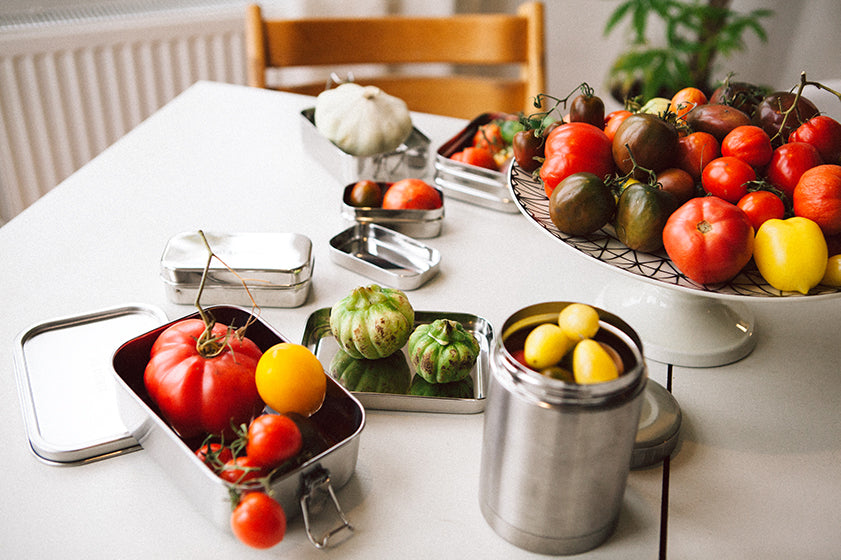
Climate protection you can bite into: This is how sustainable nutrition works
We can reduce our own footprint every day through our diet. According to the Food and Agriculture Organization, food production accounts for 20 to 30% of global greenhouse gas emissions. It is the small decisions we make every day, consciously or unconsciously, that, when added up, have a major impact on our climate.
With these changes you can do something for the climate every day:
1. Eat fewer animal products.
2. Eat more vegetables and fruits.
3. Don’t waste food.
4. Prefer regional and seasonal products.
5. Buy organic products.
6. Shop without packaging and reduce waste.
- Eat fewer animal products.
Almost 70% of the direct greenhouse gas emissions from our diet are due to animal products. Plant-based products, on the other hand, account for just under a third. A study published in October 2018 in the journal The Lancet found that a vegan diet is the best way to reduce greenhouse gas emissions. This is followed by vegetarian, pescetarian and flexitarian diets. This is pretty easy to explain: According to the UN Food and Agriculture Organization, livestock farming is responsible for almost 15 percent of global greenhouse gas emissions. Well over half of these emissions are caused by cattle farming. In second place is pork production with 9%, followed by buffalo milk and chicken and egg production with 8% each.
Healthy eating in Germany is active climate protection. It not only reduces the direct GHG emissions that arise from the production and preparation of food. It also reduces indirect CO2 emissions by avoiding land use changes and preserving carbon sinks.
So basically the most environmentally friendly diet is a vegan diet. Is that not possible for you? No problem - it makes a big difference if you reduce animal products to a minimum. Switching from an average meat consumption to a vegetarian diet reduces your ecological footprint by around 25%. If you switch to a vegan diet, it is even reduced by 35 to 40%.
- Eat more fruits and vegetables.
These foods have the least impact on our environment.
The EAT-Lancet Commission, a group of scientists from 16 different countries, investigated the relationship between diet, human health and environmental sustainability. They recommend a healthy, sustainable diet high in vegetables, fruit, whole grains, legumes, nuts and unsaturated oils. They also advise low to moderate amounts of seafood and poultry and little or no red meat, processed meat, added sugar or refined grains. A sustainable diet is a win-win situation: it is not only good for the planet, but also for our bodies.
- Don't waste food.
Food waste is responsible for 6% of global greenhouse gas emissions. That is around three times as many emissions as are emitted by all global air traffic. The majority of waste comes from private households. So there is room for improvement. We preach it again and again: Write a shopping list. Good planning when shopping is the be-all and end-all.
Also, save food and don't be too picky about the shelf life. Products can be enjoyed long after their best-before date. Our tip: take a close look at the product, smell it, taste it and only then decide whether it really should be thrown in the trash.
Even in the conventional supermarket, grab the ugly fruit or vegetables. Otherwise, it will stay there. Realize that your behavior really does make a difference. In Germany, private households are responsible for a large proportion of food waste: 4.4 million tons end up in the trash in our homes every year. That's 150 grams per person every day.
- Prefer regional and seasonal products.
If you buy regional products, you save on CO2 emissions from transport. Food that is imported by air is particularly harmful to the environment. Local and seasonal food often tastes better because it is harvested when it is ripe. The best place to buy fresh food such as fruit or vegetables is at the market or organic store, and always pay attention to where it comes from. Tip: Choose a store that you can rely on not to import food by air. Then you can be sure and don't have to check every time.
- Buy organic products.
Researchers at Cranfield University in England have calculated how a complete switch to organic farming in England and Wales would affect the environment and climate. The focus was on greenhouse gas emissions. The result: harmful emissions would fall by 20 percent in organic farming of fruit, vegetables and grains, and by around four percent in organic livestock farming.
- Shop without packaging and reduce waste.
Eating unpackaged food does not reduce your carbon footprint quite as drastically as switching to a vegan diet. The production of plastic emits fewer CO2 equivalents than cows, for example. Nevertheless, it is more environmentally friendly to avoid it. The much bigger problem is the waste that is created: in Germany, only 0.9 tons of the 5.2 million tons of packaging waste is recycled. The rest is burned, exported or ends up in the environment.
Sources:
https://www.theguardian.com/environment/2019/jan/27/environmentally-friendly-foods-samin-nosrat
https://www.wwf.ch/de/nachhaltig-leben/mein-fussabdruck-ernaehrung
https://www.canadianliving.com/health/nutrition/article/what-is-the-planetary-health-diet
WWF: Climate Change on the Plate



Leave a comment
This site is protected by hCaptcha and the hCaptcha Privacy Policy and Terms of Service apply.